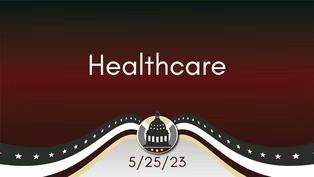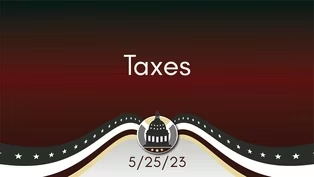Your Legislators
Sustainability of budget 5/25/23
Clip: Season 43 Episode 12 | 9m 25sVideo has Closed Captions
Host Barry Anderson and guests discuss the sustainability of the budget.
Host Barry Anderson and guests discuss the sustainability of the budget. Guests this episode: Sen. Mary Kunesh (DFL), District 39, New Brighton, Assistant Majority Leader; Sen. Zach Duckworth (R), District 57, Lakeville, Assistant Minority Leader; Rep. Jamie Long (DFL), District 61B, Minneapolis, Majority Leader; & Rep. Spencer Igo (R), District 07A, Wabana Township, Assistant Minority Leader
Problems playing video? | Closed Captioning Feedback
Problems playing video? | Closed Captioning Feedback
Your Legislators is a local public television program presented by Pioneer PBS
This program is produced by Pioneer PBS and made possible by Minnesota Corn, Minnesota Farmers Union and viewers like you.
Your Legislators
Sustainability of budget 5/25/23
Clip: Season 43 Episode 12 | 9m 25sVideo has Closed Captions
Host Barry Anderson and guests discuss the sustainability of the budget. Guests this episode: Sen. Mary Kunesh (DFL), District 39, New Brighton, Assistant Majority Leader; Sen. Zach Duckworth (R), District 57, Lakeville, Assistant Minority Leader; Rep. Jamie Long (DFL), District 61B, Minneapolis, Majority Leader; & Rep. Spencer Igo (R), District 07A, Wabana Township, Assistant Minority Leader
Problems playing video? | Closed Captioning Feedback
How to Watch Your Legislators
Your Legislators is available to stream on pbs.org and the free PBS App, available on iPhone, Apple TV, Android TV, Android smartphones, Amazon Fire TV, Amazon Fire Tablet, Roku, Samsung Smart TV, and Vizio.
Buy Now
Providing Support for PBS.org
Learn Moreabout PBS online sponsorship- Before we get to some specific questions that our viewers have, I wanna wanna wrap up the budget discussion with sort of an overall question, and I'm gonna start with you Representative Long.
If you look at the spending in the last biennium compared to this biennium, St. Paul Pioneer Press had a piece suggesting that the differences are about 38% in references to 35 or 40% depending on how you do the math.
That of course includes some one time money.
We also have the Star Tribune business column as to raise this question about slowing economic growth over some period of time, knowing that Minnesota is more in the 2% range than perhaps multiples of that number back in the '70s when the last significant budget increases occurred, at least on this order.
Taking all of that into account, are there any concerns about the sustainability of these budget increases going forward?
Was that a topic of discussion and how would you respond to viewers who have concerns about that issue?
We'll start with you Representative Long and give everyone a shot at it.
- Sure.
Thanks Barry.
I appreciate that.
So as I mentioned, the 40% is really misleading because we're just talking about that two year window when we have this really record breaking surplus that we're able to spend over those two years.
So when you're thinking about the ongoing budget, that's not an accurate number.
So when you're looking at the ongoing spending into the future, all that spending is paid for.
We are not putting ourselves into a situation where we're getting into unbalanced with our state, where we're setting up the possibility of a deficit.
We have paid for all of the investments that we're putting into really important areas that we have underinvested in for decades.
And that includes education as Senator Kunesh mentioned, and includes infrastructure as we talked a little bit about, higher education where we finally are making a real dent on trying to help people afford the ability to get higher education, childcare, housing, all of these things are areas that help our competitiveness as a state that help our businesses grow.
Because if you don't have an educated workforce, who are you gonna hire, right?
Who are you gonna find to fill those jobs if you don't have folks with affordable housing and affordable childcare?
The number one reason why people have given that they aren't going back to work is because they don't have affordable childcare.
So to create an environment where businesses in our state are able to succeed, you have to have a solid public infrastructure that includes roads that are in good shape for people to get to work and transit systems as well for people to get their goods to market and includes the educational infrastructure, includes the housing infrastructure.
These are all components of making sure that our businesses are succeeding.
And that is the vast majority of where we are investing our resources in going forward.
- Representative Igo, your thoughts on the sustainability issues that Representative Long and I were just discussing?
- Yeah, no, I think it's something we need to be deeply concerned about, right?
I mean there's, and there's some things I've already mentioned, right?
We have negative wealth migration in the state due to policies that we already have.
So when you have increased some of these taxes and the way the spending has been done, I'm worried we're gonna see more of that and then when we come back to do the budget in two years from now, we're gonna have an even bigger problem 'cause there'll be less money.
And I think the most concerning thing that I just heard there was the fact that we had surplus, we gotta spend it.
Surplus doesn't mean you have to spend, this is taxpayer dollars we're talking about here.
And some of those dollars were one-time funds from the federal government that had rolled over from the Covid pandemic that we should have used for the things that were mentioned, right?
The infrastructure taking care of those needs.
But some of this growth, the amount of FTEs we've added to the state, those are things that you can't just go back and cut without causing a lot of hurt.
Like I said, we need to think twice act once on these things.
And I unfortunately, I don't think we had that.
And now when you have places, I mean the city of St. Paul with what's been instituted just with some of these policies around housing and stuff, is gonna have a sales tax of almost 9%.
You talk about wanting to lift people up and create generational wealth, it's gonna hurt a lot when you go to buy that toaster and you have to pay 9% sales tax.
These are things that we should have talked about more and maybe pump the brakes a little bit on because now I think we're gonna see spending start to slow down.
We're gonna see that wealth migration continue to go up and we could be facing some huge problems in the future.
- Senator Kunesh, the sustainability overall budget issues that we've been discussing, your view on that?
- Well, I kind of look at it as through the lens of a, you know, a homeowner, a house, you know, a home budget.
And when you have had to live very carefully for a long time and maybe haven't kept up on the repairs in your home or been able to keep up on your healthcare because it was not affordable or you weren't able to, you know, send your kids to college because you didn't have those funds available.
But when we look at it from the governmental level, we had that surplus, it's kind of like a little bonus there, well, a big bonus, where we could plug a lot of those holes.
A lot of the areas that had been underfunded lift up a lot of communities that have been underinvested in.
Support education, we now have tuition free education for those below that poverty level.
Those are all long-term investments.
And just as Representative Long said, you know, these are things that are we paid for.
We made sure and we were very intentional.
I've heard the conversations, I heard my other members talking about how to do this in the best way that isn't going to cause those future deficits, shall we say.
And so I'm quite confident that the investments that we have put in place this session are going to really make a difference in the long term and it will prevent a lot of those issues that might have been percolating for so long that they became almost irreparable because we have now done what we needed to do to invest and continue the progress of each and every one of those areas.
So I'm confident that we'll be able to sustain this, but we'll, you know, we'll have to be careful.
We'll have to look at every budget.
We'll have to, you know, wait for those dollars that come into the state government and we have to make sure that our state government is working efficiently and at a full capacity in order to do this.
So the investment in FTEs, not only now we're creating those jobs, but we also are creating a platform of professionals that are going to be able to help us in the future.
And this definitely was a good investment.
- Senator Duckworth, your thoughts on the overall budget question before we move on to a different topic?
- Sure.
You know, it was said earlier that Minnesotans want nice things.
I think that's true.
I think Minnesotans want nice things for them and their families and their futures.
I don't think they necessarily want nice things or the nicest things for state government, especially when it comes at their expense.
This isn't all paid for.
A lot of our school districts are gonna find themselves with far greater mandated expenditures than the funding they're receiving.
That's not paid for.
It's gonna get paid for by taxpayers in the form of an increase to property taxes.
There's no question this is not sustainable.
The only way that government increasing its spending by nearly 40% is sustainable is if in the future we continue to increase taxes or we do cuts.
I don't think that we've seen the current makeup of the state government is really necessarily in favor of cuts.
I think what you're gonna see are there, they had many ideas for taxes that they wanted to do this session that they didn't do either because it was deemed to be too much or there was too much outcry about it.
I don't think we've seen the last of those proposals.
The only way that that level of spending is going to be sustained into the future is through future taxes.
I'll admit, maybe we did plug some holes, we maybe plugged a few holes when it comes to our nursing homes, but a lot of that money was used to create new government programs or to grow current government programs.
That's not plugging a hole, that's just making government even better.
And I think that we've seen, let me put it to you this way, the state of Minnesota did not grow by 40% over the last couple of years although our spending and state government will, and I think that's gonna be something that catches up with us very quickly.
And God forbid if we happen to see a little bit of a slowdown or a downturn economically, that's only gonna compound and magnify the financial, the negative financial situation we could potentially find ourselves in in the future.
Video has Closed Captions
Clip: S43 Ep12 | 8m 26s | Host Barry Anderson and guests discuss the bonding bill. (8m 26s)
Video has Closed Captions
Clip: S43 Ep12 | 7m 26s | Host Barry Anderson and guests discuss healthcare. (7m 26s)
Video has Closed Captions
Clip: S43 Ep12 | 9m 40s | Host Barry Anderson and guests discuss higher education. (9m 40s)
Video has Closed Captions
Clip: S43 Ep12 | 8m 4s | Host Barry Anderson and guests discuss taxes. (8m 4s)
Providing Support for PBS.org
Learn Moreabout PBS online sponsorship
- News and Public Affairs

Top journalists deliver compelling original analysis of the hour's headlines.

- News and Public Affairs

FRONTLINE is investigative journalism that questions, explains and changes our world.












Support for PBS provided by:
Your Legislators is a local public television program presented by Pioneer PBS
This program is produced by Pioneer PBS and made possible by Minnesota Corn, Minnesota Farmers Union and viewers like you.





